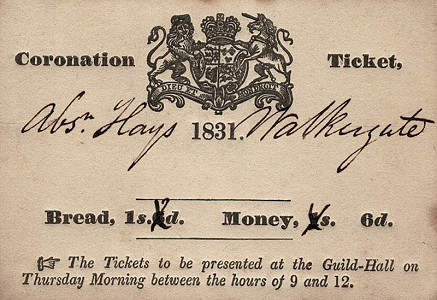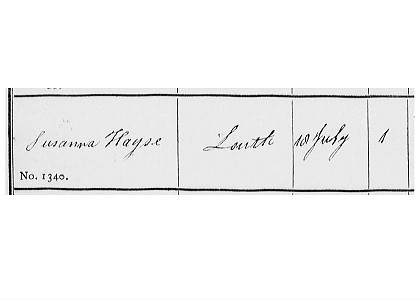Absalom Hayes, labourer

Absalom's coronation ticket

Burial of first child, age 1
The Coronation of King William IV was on Thursday 8 September 1831. Working class householders in Louth were given a ticket which entitled them to receive bread and money on that day. Shown here is the ticket given to Absalom Hayes. To claim his bread worth 1 shilling, and 6 pence in cash, he had to take his ticket to the Guildhall (now the location of the Halifax Bank) in the Cornmarket.
What do we know about Absalom Hayes? He had been born in Belleau about 7 miles south of Louth, to single woman Elizabeth Hayes. Absalom is a biblical name, a son of King David.
At the age of 18, Absalom joined the army. He was in the 10th Regiment of Foot, which later became the Royal Lincolnshire Regiment, and he must have served in the Napoleonic Wars. After 23 years service, he was discharged in 1817, because he was infirm. His discharge certificate describes him as five feet three inches in height, brown hair, hazel eyes, dark complexion, and by trade a labourer.
In June 1823, Absalom Hayes (age 47) married Elizabeth Parkins (age 25). The wedding took place in St James’ Church and was conducted by Rev Wolley Jolland. Instead of signing the church register both Absalom and Elizabeth just put a cross, which tells us that they were unable to write their names.
Absalom and Elizabeth lived in the small cottage that had been Elizabeth’s family home. It was in Harrison’s Yard, also known as Brown Horse Yard, on the northern side of Walkergate, now Queen Street. You can see the location between numbers 75 and 77 Queen Street. The cottages here were demolished in 1936 as they were ‘unfit for human habitation’. Richard Gurnham wrote (in his 2023 book ‘Louth History Around Us, Volume 2’) that prostitution, petty theft, drunkenness and brawling were commonplace in this part of the town.
Absalom and Elizabeth’s first child was baptised in December 1823 - Elizabeth must have been pregnant when they married – but lived only about 18 months. Two boys, Sylvanus (named after Elizabeth’s father) and Henry, were born in 1827 and 1829. So, in 1831 when Absalom was given his coronation ticket, he was living with his wife and two little boys.
Another baby was born in 1833 and baptised, but all was not well. Within a few weeks Elizabeth died, and then the baby. This left 57-year-old Absalom, an unskilled labourer, as a single parent with two small boys. Remember that 10 years earlier he had been described as infirm. He died in 1842. At that time Sylvanus and Henry were 15 and 13 years old. It must have been very difficult for them.
In 1842, there was a newspaper report that Sylvanus Hayes, who at that time was employed by a farmer, was caught stealing apples in Stewton Lane, but I can find no further trace of him. Henry Hayes, on the other hand, remained in Walkergate. In 1848, he was working for a brickmaker, and he was drunk in Upgate and disturbing people on their way to St James’ Church. In 1851 and 1861 he was living and working in the beer house of Mary Crashley, on the southern side of Walkergate. This establishment had a dubious reputation and was mentioned unfavourably in newspapers. Henry spent his last few years in Louth Union Workhouse.
This story of the Hayes family is sad, but typical. Life for working class people in the early 19th century was hard. Unskilled labourers and their families lived in overcrowded insanitary housing without access to clean water and good food, education for their children, or proper clothing. This led to poor public health and high death rates.